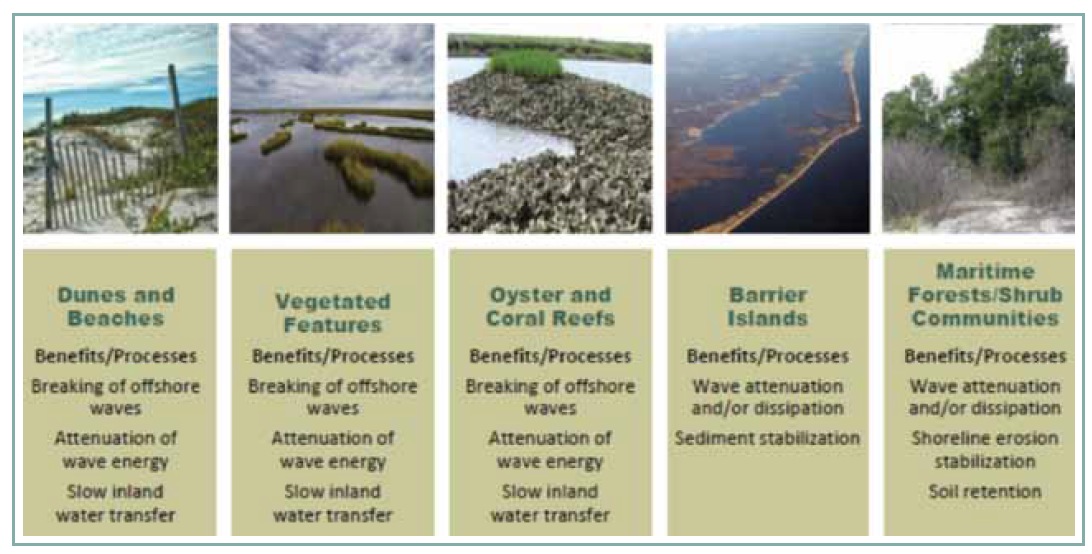NATIONAL WILDLIFE FEDERATION
Executive Summary
This report represents a collaborative effort of the National Wildlife Federation, Allied World Assurance Company, and Earth Economics to address the mounting risks of flooding and hurricanes to U.S. communities. Specifically, this report focuses on the U.S. coasts and coastal waters of the Atlantic and Pacific Oceans and the Gulf of Mexico and the nation’s extensive network of rivers and streams –places where millions of Americans live and work. It asks whether federal, state, and local officials are paying enough attention to the growing threats of floods and hurricanes across the country and whether they are using the policy tools at their disposal to protect people and property endangered by these potentially-catastrophic natural hazards.
Unfortunately, the answer to these questions is no. Far too many people who live along America’s coasts and rivers are at considerable risk of personal harm from floods and hurricanes, and their properties and economic livelihoods are highly vulnerable as well. Efforts by policy makers to grapple with and respond to these problems have been inadequate.
Yet solutions are at hand. Policy makers can make coastal and riverine communities safer and more resilient to floods and hurricanes by focusing on natural and nature-based approaches for risk reduction. These approaches protect and restore natural infrastructure such as wetlands, dunes, riparian zones, living shorelines, and natural open space. They are cost-effective and produce a host of benefits to residents in addition to flood protection, including clean water, habitat for fish and wildlife, and increased opportunities for recreation and tourism. They also produce savings for taxpayers nationwide.
This collaboration of the National Wildlife Federation, Allied World Assurance Company, and Earth Economics is driven by our organizations’ converging goals around these policy solutions. National Wildlife Federation’s interests in conserving wildlife and wildlife habitat, Allied World’s interests in ensuring sound investments in insurance and other risk reduction strategies, and Earth Economics’ interests in promoting economic methodologies that further sustainability converge around advancing the following broadly-accepted principles of resilience:
- Better understanding of actual risk may lead to more risk reduction. Adequately informing communities in areas prone to floods and hurricanes about the risks they face both now and in the future, such as through risk-based pricing of insurance and updated, science-based mapping of hazard-prone areas, is fundamental to building resilience in the face of growing threats. Once risks are better understood, there is likely to be greater interest in mitigating them.
- Investing in risk reduction now can produce large savings in the long term. Investing in risk reduction measures well in advance of floods and hurricanes provides better outcomes for communities than rebuilding after these events. It is estimated that for every $1 spent on risk reduction activities, America saves $4 in disaster costs, producing large savings for taxpayers and insurance policy holders over the long term.
- Investments in natural infrastructure maximize resilience to floods and hurricanes. Natural and nature-based approaches (i.e., protecting and restoring natural infrastructure) should be prioritized for hazard mitigation, and should be used either in combination with or as an alternative to gray infrastructure such as seawalls and levees. They often are the most-effective and least-costly option for reducing risks to communities from floods and hurricanes, and they provide an array of other critical benefits to society.
Download full version (PDF): Natural Defenses from Hurricanes and Floods
About the National Wildlife Federation
www.nwf.org
NWF works to improve federal and state policies that will improve wildlife conservation on hundreds of millions of acres of public, tribal and private lands, including thousands of miles of streams, rivers, lakes and coastlines across America. The organization encourages Congress to pass legislation that includes adequate funding for natural resources and directs federal agencies to include climate science in their wildlife conservation management plans.
Tags: Allied World Insurance Company, Earth Economics, Flooding, Hurricanes, National Wildlife Federation







 RSS Feed
RSS Feed